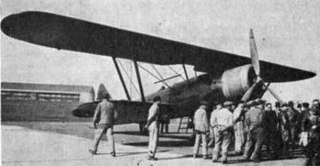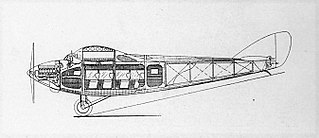
Nieuport, later Nieuport-Delage, was a French aeroplane company that primarily built racing aircraft before World War I and fighter aircraft during World War I and between the wars.

The ANF Les Mureaux 110 and its derivatives were a family of all-metal military reconnaissance aircraft developed and produced by the French aircraft manufacturer ANF Les Mureaux.

The Nieuport-Delage NiD 39 was an airliner produced in France in the late 1920s, developed from the NiD 38.

The Nieuport-Delage NiD 42 was a fighter aircraft built in France in the early 1920s, the first in a family of designs that would form the backbone of the French fighter force over the next decade.

The Latécoère 490 was a two-seat, single-engined parasol winged aircraft, designed to a French photographic reconnaissance specification of 1928. Only two prototypes were built.

The Nieuport-Delage NiD 120 was a French single-seat parasol monoplane fighter aircraft built during the 1930s. It was built in several versions that were fitted with different engines. Rejected for service with the French Air Force after a fatal crash in 1933, only a dozen aircraft were built for the Peruvian Air Force. Deliveries began at the end of 1934, but the NiD 121s were only service for a few years before a crippling shortage of spare parts after the French aviation industry was nationalized after a series of strikes in 1936. The Peruvian Air Force had exhausted its inventory of spares by early 1939 and the surviving aircraft were scrapped in late 1940.

The Potez 37 was a two-seat, long range reconnaissance aircraft built to compete for a French government contract. It flew in mid-1930 but did not win the competition, so only two were completed.

The Nieuport-Delage NiD 43 was a single-engine, two-seat biplane fighter aircraft designed and built for shipboard use in France in 1924.

The Nieuport-Delage NiD 48 was a single-engine parasol wing light fighter aircraft designed and produced by the French aircraft manufacturer Nieuport-Delage.

The Les Mureaux 3 C.2 and Les Mureaux 4 C.2 were French two seat, parasol winged fighters, flown in 1927-8, which differed only in their engines. They were developed into near identical army co-operation types, the ANF Les Mureaux 130 A.2 and ANF Les Mureaux 131 A.2, in 1929–31.

The Nieuport-Delage NiD 590 was a three engine, high wing monoplane designed for policing and other roles in France's colonies, which did not go into production or enter service.

The Potez 50 or Potez 50 A2 was a French two seat military multi-role aircraft, first flown in 1931. It did not go into service but seven variants using five different engines were produced, one of them setting several speed with useful load records and another, the Potez 506, setting three altitude world records.

The Weymann-Lepère WEL-80 R.2 was a French two seat reconnaissance aircraft built to compete for a 1928 government contract. It was not successful and did not enter production.

The Wibault 260 R.2 was a contender for a French government contract for a long range, two seat reconnaissance aircraft, issued in 1928. There were eight prototypes in the 1931-2 contest and the Wibault was not selected for production.

The SECM-Amiot 130 R.2 was a contender for a French government contract for a long range, two seat reconnaissance aircraft, issued in 1928. There were eight prototypes in the 1931–32 contest and the Amiot 130 was not selected for production.

The Nieuport-Delage NiD 740 was a French trimotor monoplane designed to carry night mail. Two were built in 1930.

The Nieuport-Delage NiD 540 was a high wing, eight seat, single engine airliner, built in France and first flown in 1930. It did not reach production.
The Nieuport-Delage NiD 450 was a French racing floatplane, originally intended to compete for the 1929 Schneider Trophy. After the French decided not to participate that year, the type was used as the NiD 650 to speed the development of the proposed entrants to the 1931 event, the NiD 651 and NiD 652. Delays in producing the latters' engines left these unflown.
The Neiuport-Delage NiD 690 was a French all-metal, single-engined colonial policing aircraft, built for a competitive government contract. Its unusual rear fuselage gave a wide field of downward machine gun fire. Only two examples were built.

The Albert A-10 was a four-seat French transport aircraft which could be rapidly converted into an air ambulance. Two or three examples were built between 1929 and 1932, using at least two different engines, but neither variant reached production.


















